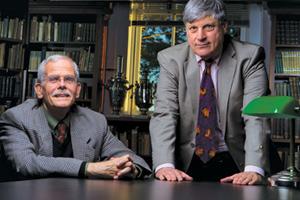By Adam Gerchick ’13
 Professors Griffiths (left) and Rabinowitz
|
Griffiths: “Stanley is an extraordinary teacher and does untold harm to his students, which you find out you can get away with.”
Rabinowitz: “I learned a few things from [Griffiths] too, but you listen to his version!”
Rick Griffiths and Stanley Rabinowitz dispensed with the formalities years ago. In an academic partnership spanning more than three decades, Griffiths, the Class of 1880 Professor in Greek and professor of women’s and gender studies, and Rabinowitz, the Henry Steele Commager Professor and professor of Russian, have explored the often-overlooked relationship between the great epics of classical antiquity and modern Russian literature.
This year, that partnership has led to the publication of their second book on the subject, Epic and the Russian Novel from Gogol to Pasternak (Academic Studies Press). Exploring the classical inspiration for such works as Fyodor Dostoevsky’s The Brothers Karamazov, Boris Pasternak’s Doctor Zhivago and Leo Tolstoy’s War and Peace, the professors’ new book continues their unlikely collaboration and innovative—and, at least initially, controversial—work.
Griffiths and Rabinowitz began their joint effort in earnest in spring 1977, when the two then-junior professors co-taught the colloquium “National Epic,” which, like their books, explored the epic origins of Russian novels. In 1990, the professors co-authored Novel Epics: Gogol, Dostoevsky, and National Narrative (Northwestern University Press).
Critical reception was mixed. The two had taken an unorthodox approach: Rather than offering an encyclopedic study on the history of Russian epic, they selected specific novels of interest and wrote in laymen’s prose. “Some people liked it and thought it was very productive, and others thought it was just too nontraditional or too experimental, or, basically, irresponsible,” Rabinowitz recalls: “‘How could you dare do this when you didn’t mention this, that and the other thing?’”
Their detractors were unsparing. As Griffiths remembers, “Some of the negative reviewers told us, ‘Give up the project. Don’t try to revise it; don’t try to save it. You’re doing a disservice to mankind.’”
Rabinowitz one-ups him: “One said that he had heard of the New Criticism—very disparagingly, ‘the New Criticism’—‘but the New Illiteracy!’ And that’s what we were.”
Nonetheless, many academic readers praised the book, and the professors found support among the Amherst faculty and administration. The Dean of the Faculty’s Office funded the book’s translation into Russian, published in 2005.
Then, at an Amherst symposium a few years ago, a Yale professor approached Rabinowitz to commend him on the original book and note that it was hard to find for sale. That inspired Griffiths and Rabinowitz to create a new, expanded edition, with three additional chapters based on articles they’d written. They published the longer edition, Epic and the Russian Novel, this year.
Rabinowitz credits the academic atmosphere of Amherst with enabling the collaboration: “This is not the kind of teaching or kind of project or writing that I would ever have imagined doing if I had been at a university. Some of these people who wrote these scathing reviews might have been sitting on the tenure committee saying, ‘This will not do. You’re out of here.’ On the contrary, Amherst was quite accepting. They love this kind of stuff.”
Photo by Rob Mattson